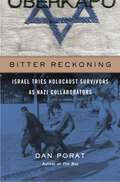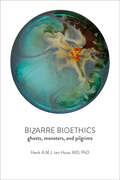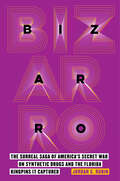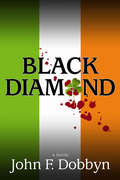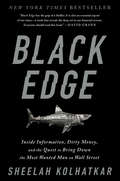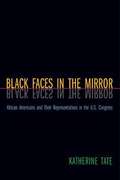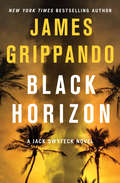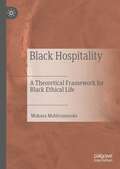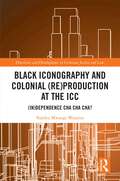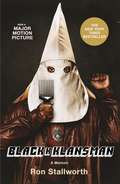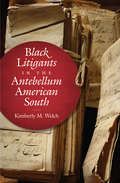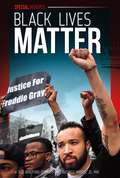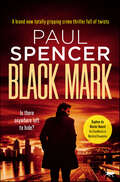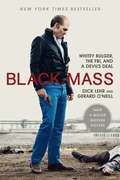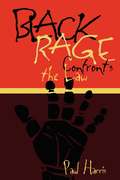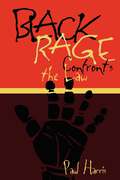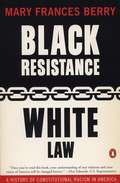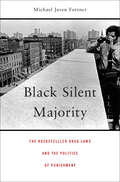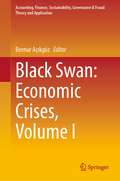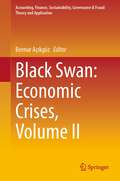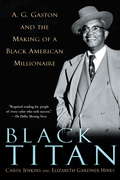- Table View
- List View
Bitter Reckoning: Israel Tries Holocaust Survivors as Nazi Collaborators
by Dan PoratDigging into newly declassified archives, Dan Porat unearths the story of Jews prosecuted by the State of Israel for Nazi collaboration. Over time courts and the public came to see Jewish ghetto administrators or kapos as tragic figures. Rigorous yet humane, Porat invites us to rethink ideas about victimhood, justice, and collective memory.
Bizarre Bioethics: Ghosts, Monsters, and Pilgrims
by Henk A.M.J. ten HaveThe focus of bioethical debates on exceptional cases neglects the underlying values—like justice and community—that would lend to a broader, more well-rounded understanding of today's world.Discussions of ethical problems in health care too often concentrate on exceptional cases. Bioethical controversies triggered by experimental drugs, gene-edited babies, or life extension are understandably fascinating: they showcase the power of medical science and technology while addressing anxieties concerning health, disease, suffering, and death. However, the focus on rare individual cases in the media spotlight turns attention away from more pressing ethical issues that impact global populations, such as access to health care, safe food and water, and the prevention of emerging infectious diseases. In Bizarre Bioethics, Henk A.M.J. ten Have argues that this focus on bizarre cases leads to bizarre bioethics with a narrow agenda for ethical debate. In other words, although these extreme cases are undeniably real, they present a limited and skewed view of everyday moral reality. This focus also assumes that individuals are rational decision-makers, so that the role of feelings and emotions can be downgraded. Larger questions related to justice, solidarity, community, meaning, and ambiguity are not appreciated. Such questions used to be posed by philosophical and theological traditions, but they have been exorcised and marginalized in the development of bioethics. Science, ten Have writes, is not a value-free endeavor that provides facts and evidence: it is driven by underlying value perspectives that are often based on metaphors and world views from philosophical and theological traditions. Drawing on a rich analysis of the literature, ten Have explains how bioethical discussion can be enriched by these metaphors and develops a broader approach that critically delves into the imaginative world views that determine understanding of the world and human existence. Examining the roles of the metaphors of ghosts, monsters, pilgrims, prophets, and relics, ten Have illustrates how science and medicine are animated by imaginations that fuel the search for hope, salvation, healing, and a predictable future. Bizarre Bioethics invites students, researchers, policymakers and teachers interested in ethics and health care to think about the value perspectives on health and disease today.
Bizarro: The Surreal Saga of America's Secret War on Synthetic Drugs and the Florida Kingpins It Captured
by Jordan S. RubinInside a drug war so screwy that people don’t know what’s illegal—until it’s too late. Bizarro is a page-turning tale of the unprecedented prosecution of Burton Ritchie and Ben Galecki, the Florida-based founders of a sprawling "spice" (synthetic cannabinoid) operation. With this book, journalist and former New York City narcotics prosecutor Jordan S. Rubin exposes a Reagan-era law called the Analogue Act, which targets dealers selling drugs that are "substantially similar" to controlled substances—an unwieldy law that produces erratic results in court. Rubin brings readers deep inside the synthetic war, exploring how Ritchie and Galecki landed in its crosshairs and why one of the DEA’s own chemists may have been their best chance at freedom, until he was arrested too. This stranger-than-fiction narrative is backed by thousands of pages of court records and exclusive interviews with defendants, lawyers, law enforcement, celebrities, and more. Bizarro reveals the world of underground chemists making drugs faster than the government can ban them, dealers making millions in a gray market, and a justice system run amok.
Black Diamond: A Novel (A Knight and Devlin Thriller #3)
by John F. DobbynIn the crosshairs of two warring mobsMichael Knight and Lex Devlin agree to defend a jockey accused of murdering a fellow jockey during a race at Boston's Suffolk Downs. Michael's expertise in the machinations of the horse racing game is expected to serve them well. But a personal attachment to the murdered jockey thrusts Michael and Lex into the midst of conflict between Boston's Irish mafia and remnants of the terrorist branch of the Irish Republican Army. Now they are in the crosshairs of both, and the brutality of these combatants knows no bounds. As Michael and Lex uncover layer after layer of deceptions involved in the seamier side of horse racing, they become more dangerous to the gangs. In action that shuttles between Ireland and Boston, the lives of the lawyers as well as those close to them are in the gravest danger and the criminals show no mercy in their quest to put an end to this threat. As their investigation hurtles forward, it could end a wonderful law partnership due to the absence of living partners.
Black Edge: Inside Information, Dirty Money, and the Quest to Bring Down the Most Wanted Man on Wall Street
by Sheelah KolhatkarThe story of the billionaire trader Steven A. Cohen, the rise and fall of his hedge fund, SAC Capital, and the largest insider trading investigation in history—for readers of The Big Short, Den of Thieves, and Dark Money. The rise over the last two decades of a powerful new class of billionaire financiers marks a singular shift in the American economic and political landscape. Their vast reserves of concentrated wealth have allowed a small group of big winners to write their own rules of capitalism and public policy. How did we get here? Through meticulous reporting and powerful storytelling, New Yorker staff writer Sheelah Kolhatkar shows how Steve Cohen became one of the richest and most influential figures in finance—and what happened when the Justice Department put him in its crosshairs. Cohen and his fellow pioneers of the hedge fund industry didn’t lay railroads, build factories, or invent new technologies. Rather, they made their billions through speculation, by placing bets in the market that turned out to be right more often than wrong—and for this they have gained not only extreme personal wealth but formidable influence throughout society. Hedge funds now manage nearly $3 trillion in assets, and competition between them is so fierce that traders will do whatever they can to get an edge. Cohen was one of the industry’s greatest success stories. He mastered poker in high school, went off to Wharton, and in 1992 launched SAC Capital, which he built into a $15 billion empire, almost entirely on the basis of his wizardlike stock trading. He cultivated an air of mystery, reclusiveness, and extreme excess, building a 35,000 square foot mansion in Greenwich, Connecticut, and amassing one of the largest private art collections in the world. On Wall Street, Cohen was revered as a genius. That image was shattered when SAC became the target of a sprawling, seven-year government investigation. Labeled by prosecutors as a “magnet for market cheaters” whose culture encouraged the relentless hunt for “edge”—and even “black edge,” or inside information—SAC was ultimately indicted in connection with a vast insider trading scheme, even as Cohen himself was never charged. Black Edge offers a revelatory look at the gray zone in which so much of Wall Street functions, and a window into the transformation of the U.S. economy. It’s a riveting, true-life legal thriller that takes readers inside the government’s pursuit of Cohen and his employees, and raises urgent questions about the power and wealth of those who sit at the pinnacle of modern Wall Street. Advance praise for Black Edge“Well-written, with pointed characterizations of the ambitious players and their motives, this book is highly recommended for readers interested in finance, crime, and politics.”—Library Journal (starred review) “A tour de force of groundbreaking reporting and brilliant storytelling, a revealing inside account of how the Feds track a high-profile target—and, just as important, an unsettling portrayal of how Wall Street works today.”—Jeffrey Toobin, New York Times bestselling author of American Heiress “Black Edge is not just a work of major importance, it is also addictively readable—and horrifyingly compelling.”—Jane Mayer, New York Times bestselling author of Dark Money “Fast-paced and filled with twists, Black Edge has the grip of a thriller.”—David Grann, New York Times bestselling author of The Lost City of Z
Black Faces in the Mirror: African Americans and Their Representatives in the U. S. Congress
by Katherine TateHere, Katherine Tate examines the significance of race in the U. S. system of representative democracy for African Americans. Presenting important new findings, she offers the first empirical study to take up the question of representation from both sides of the constituent-representative relationship. The first half of the book examines whether black members of the U. S. House legislate and represent their constituents differently than white members do. Representation is broadly conceptualized to include not only legislators' roll call voting behavior and bill sponsorship, but also the symbolic acts in which they engage. The second half looks at the issue of representation from the perspective of ordinary African Americans based on a landmark national survey. Tate's findings are mixed. But, in the main, legislators' race does shape how they represent their constituents and how constituents evaluate them. African Americans view black representatives more positively than they do white representatives, even those who belong to their own political party. Black legislators, however, are just as likely as white representatives to sponsor and gain passage of bills in the House. Tate also concludes that black House members are more liberal as a group than are their black constituents, but that there is considerable divergence in the quality and type of representation they provide. The findings reported here will generate controversy in the fields of politics, law, and race, particularly as debate commences over renewing the Voting Rights Act, which is set to expire in 2007.
Black Horizon (Jack Swyteck #11)
by James Grippando<P>Miami attorney Jack Swyteck finds himself in the middle of an international legal battle over a Cuban oil spill that sets him on a deadly mission. <P>Three summers after the Deepwater Horizon environmental catastrophe, oil is spewing into the ocean again, this time from a drilling explosion in Cuban waters just fifty miles from the Florida Keys. The slick is headed straight for the United States, but the Cubans refuse American offers to assist with the cleanup, and threaten to fire on "hostile" U.S. vessels entering their waters. Backstopping the Cubans is the powerful consortium that owned and operated the rig, and is tied to the Chinese, Russian, and Venezuelan governments, who stonewall all inquiries and relief efforts. <P>Jack and his new wife, Andie Henning, an undercover agent for the FBI, are honeymooning in the Keys when Andie is called away on an assignment shrouded in secrecy. Jack, too, is soon back at work, representing an American woman whose Cuban husband was killed in the rig explosion. Though the spill occurred in foreign waters, Jack draws on all his legal know-how to file a wrongful death suit in a U.S. court and hopefully bring the young widow a semblance of closure. <P>Jack's pursuit of the unimaginably complicated international case plunges him into a dangerous world filled with treacherous twists that lead him--and Andie--to the same shocking realization . . . that the looming environmental disaster may have been no "accident" at all.
Black Hospitality: A Theoretical Framework for Black Ethical Life
by Mukasa MubirumusokeThis book addresses the paucity of robust reflections on ethics as a distinct field of experience in recent Black Studies scholarship. Following the intervention of the Afro-Pessimist school of thought—spearheaded by the likes of Frank Wilderson III and Jared Sexton—there has been much needed attention brought to the totalizing nature of Black political degradation and vulnerability in America. However, an in depth reflection on the ethical implications of this political positionality is lacking and in places even implied to not be possible. Black Hospitality conceptualizes what the author argues is the aporetic experience of Black ethical life as both excessively vulnerable within and yet also ultimately hostile to an anti-black political ontology. Engaging the work of scholars such as Fred Moten, Saidiya Hartman, Nahum Chandler, Jacques Derrida, Theodor Adorno, and Toni Morrison, along with the concepts of fugitivity, Black sociality, im-possibility, and paraontology, Black Hospitality insists that Black ethical life provides a necessary broadening of the contours of Black experience.
Black Iconography and Colonial (re)production at the ICC: (In)dependence Cha Cha Cha?
by Stanley Mwangi WanjiruThis book explores the reproduction of colonialism at the International Criminal Court (ICC), and examines International criminal law (ICL) vs the Black body through an immersive format of Art, Music, Poetry, and Architecture and post-colonial/critical race theory lens. Taking a multi-disciplinary approach, the book interrogates the operationalization of the Rome statute to detail a Eurocentric hegemony at the core of ICL. It explores how colonialism and slavery have come to shape ICL, exposing the perpetuation of the colonial and warns that it heralds ominous contemporary and future implications for Africa. As currently envisaged and acted out at the ICC, this law is founded on deceptive and colonial ideas of ‘what is wrong’ in/with the world. The book finds that the contemporary ICL regime is founded on white supremacy that corrupts the law’s interaction with the African. The African is but a unit utilised by the global elite to exploit and extract. From time to time, these alliances disintegrate with ICL becoming a retaliatory tool of choice. What is at stake, is power, not justice. This power is hierarchical with Eurocentrism at the top throughout modern history. Colonialism is seen not to have ended but to have regerminated through the foundation of the ‘independent’ African state. The ICC reproduces the colonial by use of European law, and ultimately the over representation of the black accused. To conclude, the book provides a liberated African forum that can address conflicts in the content, with a call for the end of the ICC’s involvement in Africa. The demand is made for an African Court that utilises non-colonising African norms which are uniquely suited to address local conflicts. Multidisciplinary in nature, this book will be of great interest to students and scholars of International Criminal Law, Criminal Justice, Human Rights Law, African Studies, Global Social Justice, Sociology, Anthropology, Postcolonial Studies, and Philosophy.
Black Klansman: Race, Hate, and the Undercover Investigation of a Lifetime
by Ron StallworthThe extraordinary true story and basis for the major motion picture BlacKkKlansman, written and directed by Spike Lee, produced by Jordan Peele, and starring John David Washington and Adam Driver. <P><P>When detective Ron Stallworth, the first black detective in the history of the Colorado Springs Police Department, comes across a classified ad in the local paper asking for all those interested in joining the Ku Klux Klan to contact a P.O. box, Detective Stallworth does his job and responds with interest, using his real name while posing as a white man. <P><P>He figures he’ll receive a few brochures in the mail, maybe even a magazine, and learn more about a growing terrorist threat in his community. A few weeks later the office phone rings, and the caller asks Ron a question he thought he’d never have to answer, “Would you like to join our cause?” <P><P>This is 1978, and the KKK is on the rise in the United States. Its Grand Wizard, David Duke, has made a name for himself, appearing on talk shows, and major magazine interviews preaching a “kinder” Klan that wants nothing more than to preserve a heritage, and to restore a nation to its former glory. <P><P>Ron answers the caller’s question that night with a yes, launching what is surely one of the most audacious, and incredible undercover investigations in history. Ron recruits his partner Chuck to play the "white" Ron Stallworth, while Stallworth himself conducts all subsequent phone conversations. <P><P>During the months-long investigation, Stallworth sabotages cross burnings, exposes white supremacists in the military, and even befriends David Duke himself. Black Klansman is an amazing true story that reads like a crime thriller, and a searing portrait of a divided America and the extraordinary heroes who dare to fight back. <P><b>A New York Times Bestseller</b>
Black Litigants in the Antebellum American South (The John Hope Franklin Series in African American History and Culture)
by Kimberly M. WelchIn the antebellum Natchez district, in the heart of slave country, black people sued white people in all-white courtrooms. They sued to enforce the terms of their contracts, recover unpaid debts, recuperate back wages, and claim damages for assault. They sued in conflicts over property and personal status. And they often won. Based on new research conducted in courthouse basements and storage sheds in rural Mississippi and Louisiana, Kimberly Welch draws on over 1,000 examples of free and enslaved black litigants who used the courts to protect their interests and reconfigure their place in a tense society.To understand their success, Welch argues that we must understand the language that they used--the language of property, in particular--to make their claims recognizable and persuasive to others and to link their status as owner to the ideal of a free, autonomous citizen. In telling their stories, Welch reveals a previously unknown world of black legal activity, one that is consequential for understanding the long history of race, rights, and civic inclusion in America.
Black Lives Matter
by Duchess Harris Sue Bradford EdwardsBlack Lives Matter covers the shootings that touched off passionate protests, the work of activists to bring about a more just legal system, and the tensions in US society that these events have brought to light. Aligned to Common Core Standards and correlated to state standards. Essential Library is an imprint of Abdo Publishing, a division of ABDO.
Black Mark
by Paul SpencerHe couldn&’t save his reputation, his marriage, or his career—but he&’s dead-set on saving a friend framed for murder . . . Divorced, disbarred, and broke. That&’s where former defense attorney Mick Ward found himself after a drug-fueled collapse, and now all he wants is a quiet life. But when he discovers a body on his friend Elliott&’s property, Mick has to get involved. Because the body belongs to a rival from Elliott&’s criminal past, and someone&’s planted a gun in his house. Currently a Black Lives Matter activist running for Portland&’s city council, Elliott suspects he&’s been targeted by vengeful cops. But the worst is yet to come, and with Mick unable to practice law, he&’ll have to work around the system any way he can to help his friend . . .
Black Mass: Whitey Bulger, the FBI, and a Devil's Deal
by Dick Lehr Gerard O'NeillJohn Connolly and James “Whitey” Bulger grew up together on the tough streets of South Boston. Decades later in the mid-1970s, they met again. By then, Connolly was a major figure in the FBI’s Boston office and Whitey had become godfather of the Irish Mob. Connolly had an idea, a scheme that might bring Bugler into the FBI fold and John Connolly into the Bureau’s big leagues. But Bulger had other plans. Soon to be a major motion picture starring Johnny Depp as Whitey Bulger, Black Mass is the chilling true story of what happened between them—a dark deal that spiraled out of control, leading to drug dealing, racketeering, and murder.
Black Mass: Whitey Bulger, the FBI, and a Devil's Deal
by Dick Lehr Gerard O'NeillJohn Connolly and James "Whitey" Bulger grew up together on the tough streets of South Boston. Decades later in the mid-1970s, they met again. By then, Connolly was a major figure in the FBI's Boston office and Whitey had become godfather of the Irish Mob. Connolly had an idea, a scheme that might bring Bugler into the FBI fold and John Connolly into the Bureau's big leagues. But Bulger had other plans. Soon to be a major motion picture starring Johnny Depp as Whitey Bulger, Black Mass is the chilling true story of what happened between them--a dark deal that spiraled out of control, leading to drug dealing, racketeering, and murder.
Black Morocco
by Chouki El HamelBlack Morocco: A History of Slavery, Race and Islam chronicles the experiences, identity, and achievements of enslaved black people in Morocco from the sixteenth century to the beginning of the twentieth century. Chouki El Hamel argues that we cannot rely solely on Islamic ideology as the key to explain social relations and particularly the history of black slavery in the Muslim world, for this viewpoint yields an inaccurate historical record of the people, institutions, and social practices of slavery in Northwest Africa. El Hamel focuses on black Moroccans' collective experience beginning with their enslavement to serve as the loyal army of the Sultan Isma'il. By the time the Sultan died in 1727, they had become a political force, making and unmaking rulers well into the nineteenth century. The emphasis on the political history of the black army is augmented by a close examination of the continuity of black Moroccan identity through the musical and cultural practices of the Gnawa.
Black Rage Confronts the Law (Critical America #19)
by Paul HarrisIn 1971, Paul Harris pioneered the modern version of the black rage defense when he successfully defended a young black man charged with armed bank robbery. Dubbed one of the most novel criminal defenses in American history by Vanity Fair, the black rage defense is enormously controversial, frequently dismissed as irresponsible, nothing less than a harbinger of anarchy. Consider the firestorm of protest that resulted when the defense for Colin Ferguson, the gunman who murdered numerous passengers on a New York commuter train, claimed it was considering a black rage defense. In this thought-provoking book, Harris traces the origins of the black rage defense back through American history, recreating numerous dramatic trials along the way. For example, he recounts in vivid detail how Clarence Darrow, defense attorney in the famous Scopes Monkey trial, first introduced the notion of an environmental hardship defense in 1925 while defending a black family who shot into a drunken white mob that had encircled their home. Emphasizing that the black rage defense must be enlisted responsibly and selectively, Harris skillfully distinguishes between applying an environmental defense and simply blaming society, in the abstract, for individual crimes. If Ferguson had invoked such a defense, in Harris's words, it would have sent a superficial, wrong-headed, blame-everything-on-racism message. Careful not to succumb to easy generalizations, Harris also addresses the possibilities of a white rage defense and the more recent phenomenon of cultural defenses. He illustrates how a person's environment can, and does, affect his or her life and actions, how even the most rational person can become criminally deranged, when bludgeoned into hopelessness by exploitation, racism, and relentless poverty.
Black Rage Confronts the Law (Critical America #19)
by Paul HarrisTraces the origins of the black rage defense in criminal court historyIn 1971, Paul Harris pioneered the modern version of the black rage defense when he successfully defended a young black man charged with armed bank robbery. Dubbed one of the most novel criminal defenses in American history by Vanity Fair, the black rage defense is enormously controversial, frequently dismissed as irresponsible, nothing less than a harbinger of anarchy. Consider the firestorm of protest that resulted when the defense for Colin Ferguson, the gunman who murdered numerous passengers on a New York commuter train, claimed it was considering a black rage defense. In this thought-provoking book, Harris traces the origins of the black rage defense back through American history, recreating numerous dramatic trials along the way. For example, he recounts in vivid detail how Clarence Darrow, defense attorney in the famous Scopes Monkey trial, first introduced the notion of an environmental hardship defense in 1925 while defending a black family who shot into a drunken white mob that had encircled their home. Emphasizing that the black rage defense must be enlisted responsibly and selectively, Harris skillfully distinguishes between applying an environmental defense and simply blaming society, in the abstract, for individual crimes. If Ferguson had invoked such a defense, in Harris's words, it would have sent a superficial, wrong-headed, blame-everything-on-racism message. Careful not to succumb to easy generalizations, Harris also addresses the possibilities of a white rage defense and the more recent phenomenon of cultural defenses. He illustrates how a person's environment can, and does, affect his or her life and actions, how even the most rational person can become criminally deranged, when bludgeoned into hopelessness by exploitation, racism, and relentless poverty.
Black Resistance, White Law: A History of Constitutional Racism in America
by Mary Frances BerryHow the government has used the Constitution to deny black Americans their legal rights From the arrival of the first twenty slaves in Jamestown to the Howard Beach Incident of 1986, Yusef Hawkins, and Rodney King, federal law enforcement has pleaded lack of authority against white violence while endorsing surveillance of black rebels and using "constitutional" military force against them. In this groundbreaking study, constitutional scholar Mark Frances Berry analyzes the reasons why millions of African Americans whose lives have improved enormously, both socially and economically, are still at risk of police abuse and largely unprotected from bias crimes.
Black Silent Majority: The Rockefeller Drug Laws and the Politics of Punishment
by Michael Javen FortnerCurrent anti-drug policies are based on a set of controversial laws first adopted in New York in the early 1970s and championed by the state’s Republican governor, Nelson Rockefeller. Fortner traces how many blacks in New York came to believe that the rehabilitation-focused liberal policies of the 1960s had failed. Faced with economic malaise and rising rates of addiction and crime, they blamed addicts and pushers. By 1973, the outcry from grassroots activists and civic leaders in Harlem calling for drastic measures presented Rockefeller with a welcome opportunity to crack down on crime and boost his political career. New York became the first state to mandate long prison sentences for selling or possessing narcotics. Black Silent Majority lays bare the tangled roots of a pernicious system. America’s drug policies, while in part a manifestation of the conservative movement, are also a product of black America’s confrontation with crime and chaos in its own neighborhoods.
Black Silent Majority: The Rockefeller Drug Laws and the Politics of Punishment
by Michael Javen FortnerAggressive policing and draconian sentencing have disproportionately imprisoned millions of African Americans for drug-related offenses. Michael Javen Fortner shows that in the 1970s these punitive policies toward addicts and pushers enjoyed the support of many working-class and middle-class blacks, angry about the chaos in their own neighborhoods.
Black Swan: Economic Crises, Volume I (Accounting, Finance, Sustainability, Governance & Fraud: Theory and Application)
by Bernur AçıkgözThis book presents to the reader the economic, fiscal and financial crises in world history that have had a great impact on the entire world and the fiscal measures taken by governments to combat each crisis since the 1600s in chronological order. Such events are often described as Black Swans, a concept introduced by economist and risk analyst Nassim Nicholas Taleb in the book Fooled By Randomness in 2001, in reference to events that were thought to be impossible but had a huge impact when they did happen.The first part of the book discusses the crisis models in order to allow the reader to better understand the financial, fiscal and economic crises that are detailed in the following chapters. Each chapter starts with an overview of the crisis in question followed by an analysis of the impact on the affected countries. They go on to highlight the causes of the crisis in question, the fiscal and financial measures employed to recover from it and ends on a description of the post-crisis period.Given the profusion of black swan events that the 21st century has already witnessed, this book would be a valuable read for academics and students of economics as well as practitioners and policy makers.
Black Swan: Economic Crises, Volume II (Accounting, Finance, Sustainability, Governance & Fraud: Theory and Application)
by Bernur AçıkgözThis book continues the discussion from Volume I on economic, fiscal, and financial crises in world history that have had a great impact on the entire world and the fiscal measures taken by governments to combat each crisis. Such events are often described as black swans, a concept introduced by Economist and Risk Analyst Nassim Nicholas Taleb in the book Fooled By Randomness in 2001, in reference to events that were thought to be impossible but had a huge impact when they did happen.The beginning of this book notes that crises are catastrophic periods when the consequences of economic mistakes made by governments are reflected to the public. Although economic crises are seen as opportunities in some cases, they have created a burden for the people. Some economic crises even triggered the world war. A recent example, Adolf Hitler, was seen as a hope of salvation in Germany due to the Great Depression and was brought to power.The twentieth century, when two great world wars took place on the stage of history, is the witness of major economic crises as well as wars. These crises have caused social and economic paradigm shifts to be experienced much faster and more effectively than the previous centuries. The transformation of the demand-oriented economic understanding created by the Great Depression in 1929 into an interventionist social state understanding, especially after the World War Two, increased the intervention of states in the socioeconomic field. In this period, the reconstruction of the countries, the development of social welfare services, the assurance of human rights, the acceleration of industrialization and development, and the economic growth and income growth of the countries resulted in the golden age enjoyed by the societies of the period.The interventionist social state, seen as a prescription and opportunity in the past crisis, was one of the cornerstones of the crisis in the last quarter of the century in the 1970s. Against interventionism, with the rise of neo-liberalism, financial liberalization, information society, and technological discoveries, globalization has become the new phenomenon of the age. This book examines in detail the causes, occurrences, and results of the twentieth-century crises.
Black Titan: A. G. Gaston and the Making of a Black American Millionaire
by Carol Jenkins Elizabeth Gardner HinesThe grandson of slaves, born into poverty in 1892 in the Deep South, A. G. Gaston died more than a century later with a fortune worth well over $130 million and a business empire spanning communications, real estate, and insurance. Gaston was, by any measure, a heroic figure whose wealth and influence bore comparison to J. P. Morgan and Andrew Carnegie. Here, for the first time, is the story of the life of this extraordinary pioneer, told by his niece and grandniece, the award-winning television journalist Carol Jenkins and her daughter Elizabeth Gardner Hines. Born at a time when the bitter legacy of slavery and Reconstruction still poisoned the lives of black Americans, Gaston was determined to make a difference for himself and his people. His first job, after serving in the celebrated all-black regiment during World War I, bound him to the near-slavery of an Alabama coal mine—but even here Gaston saw not only hope but opportunity. He launched a business selling lunches to fellow miners, soon established a rudimentary bank—and from then on there was no stopping him. A kind of black Horatio Alger, Gaston let a single, powerful question be his guide:What do our people need now?His success flowed from an uncanny genius for knowing the answer. Combining rich family lore with a deep knowledge of American social and economic history, Carol Jenkins and Elizabeth Hines unfold Gaston’s success story against the backdrop of a century of crushing racial hatred and bigotry. Gaston not only survived the hardships of being black during the Depression, he flourished, and by the 1950s he was ruling a Birmingham-based business empire. When the movement for civil rights swept through the South in the late 1950s and early 1960s, Gaston provided critical financial support to many activists. At the time of his death in 1996, A. G. Gaston was one of the wealthiest black men in America, if notthewealthiest. But his legacy extended far beyond the monetary. He was a man who had proved it was possible to overcome staggering odds and make a place for himself as a leader, a captain of industry, and a far-sighted philanthropist. Writing with grace and power, Jenkins and Hines bring their distinguished ancestor fully to life in the pages of this book. Black Titanis the story of a man who created his own future—and in the process, blazed a future for all black businesspeople in America.
Black Titan: A.G. Gaston and the Making of a Black American Millionaire
by Carol Jenkins Elizabeth Gardner HinesThe grandson of slaves, born into poverty in 1892 in the Deep South, A. G. Gaston died more than a century later with a fortune worth well over $130 million and a business empire spanning communications, real estate, and insurance. Gaston was, by any measure, a heroic figure whose wealth and influence bore comparison to J. P. Morgan and Andrew Carnegie. Here, for the first time, is the story of the life of this extraordinary pioneer, told by his niece and grandniece, the award-winning television journalist Carol Jenkins and her daughter Elizabeth Gardner Hines.Born at a time when the bitter legacy of slavery and Reconstruction still poisoned the lives of black Americans, Gaston was determined to make a difference for himself and his people. His first job, after serving in the celebrated all-black regiment during World War I, bound him to the near-slavery of an Alabama coal mine--but even here Gaston saw not only hope but opportunity. He launched a business selling lunches to fellow miners, soon established a rudimentary bank--and from then on there was no stopping him. A kind of black Horatio Alger, Gaston let a single, powerful question be his guide: What do our people need now? His success flowed from an uncanny genius for knowing the answer. Combining rich family lore with a deep knowledge of American social and economic history, Carol Jenkins and Elizabeth Hines unfold Gaston's success story against the backdrop of a century of crushing racial hatred and bigotry. Gaston not only survived the hardships of being black during the Depression, he flourished, and by the 1950s he was ruling a Birmingham-based business empire. When the movement for civil rights swept through the South in the late 1950s and early 1960s, Gaston provided critical financial support to many activists.At the time of his death in 1996, A. G. Gaston was one of the wealthiest black men in America, if not the wealthiest. But his legacy extended far beyond the monetary. He was a man who had proved it was possible to overcome staggering odds and make a place for himself as a leader, a captain of industry, and a far-sighted philanthropist. Writing with grace and power, Jenkins and Hines bring their distinguished ancestor fully to life in the pages of this book. Black Titan is the story of a man who created his own future--and in the process, blazed a future for all black businesspeople in America.From the Hardcover edition.
